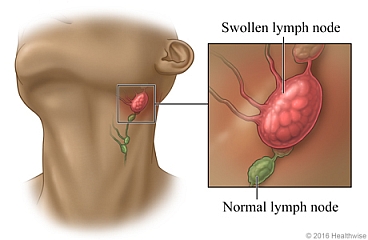
Your Care Instructions
Lymph nodes are small, bean-shaped glands throughout the body. They help the body fight germs and infections.
Many things can cause the lymph nodes to swell. In most cases, swollen lymph nodes are not serious. Sometimes lymph nodes can swell when there is an infection in the area. For example, the lymph nodes in the neck, under the chin, or behind the ears may swell and hurt a little when your child has a cold or sore throat. And an injury or infection in a leg or foot can make the lymph nodes in your child's groin swell.
Treatment depends on what caused your child's lymph nodes to swell. In most cases, the lymph nodes return to normal size on their own after the cause is gone. It may take a few weeks before the swelling goes away. If the swollen lymph nodes are caused by an infection, your doctor may prescribe antibiotics.
Follow-up care is a key part of your child's treatment and safety. Be sure to make and go to all appointments, and call your doctor if your child is having problems. It's also a good idea to know your child's test results and keep a list of the medicines your child takes.
How can you care for your child at home?
- If the doctor prescribed antibiotics for your child, give them as directed. Do not stop using them just because he or she feels better. Your child needs to take the full course of antibiotics.
- Do not squeeze, drain, or puncture a painful lump. Doing this can irritate or inflame the lump, push any existing infection deeper into your child's skin, or cause severe bleeding. And make sure your child does not squeeze or pick at the lump.
- Make sure your child drinks plenty of fluids.
- If your child has pain from the swollen lymph nodes, give your child an over-the-counter pain medicine, such as acetaminophen (Tylenol) or ibuprofen (Advil, Motrin). Be safe with medicines. Read and follow all instructions on the label. Do not give aspirin to anyone younger than 20. It has been linked to Reye syndrome, a serious illness.
- Do not give your child two or more pain medicines at the same time unless the doctor told you to. Many pain medicines have acetaminophen, which is Tylenol. Too much acetaminophen (Tylenol) can be harmful.
When should you call for help?
Call your doctor now or seek immediate medical care if:
- Your child has worse symptoms of infection, such as:
- Increased pain, swelling, warmth, or redness.
- Red streaks leading from the area.
- Pus draining from the area.
- A fever.
Watch closely for changes in your child's health, and be sure to contact your doctor if:
- Your child's lymph nodes do not get smaller or do not return to normal.
- Your child does not get better as expected.
Where can you learn more?
Go to http://www.healthwise.net/patientEd
Enter X173 in the search box to learn more about "Swollen Lymph Nodes in Children: Care Instructions".
Current as of: October 27, 2024
Author: Ignite Healthwise, LLC Staff
Clinical Review Board
All Healthwise education is reviewed by a team that includes physicians, nurses, advanced practitioners, registered dieticians, and other healthcare professionals.

